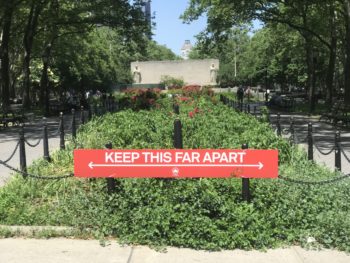
A sign at Cadman Plaza Park, Brooklyn reminding visitors to social distance./Image Credit: May Vutrapongvatana
The First Amendment allows the State to pass public health regulations that impact the manner of protests if they are written and enforced neutrally. On May 25, 2020, George Floyd was killed by a police officer while in the custody of the Minneapolis Police Department. Since Floyd’s death, demonstrations and rallies have been held in different parts of the City to protest systemic racism and law enforcement misconduct. Taking place on City’s streets, sidewalks, and in parks, the protests have drawn crowds of thousands of people which has raised concerns over the spread of COVID-19.
To prevent the spread of the virus, the State has enforced social distancing and face covering regulations that apply to any person who is in public. However, the recent protests have raised questions on how these public health regulations impact one’s First Amendment right to protest.
Currently, the State has required that any time a person is in a public space, they must keep six feet away from others who live in a different household, must not gather in groups of more than ten people, and must wear a face covering such as a mask, bandana, or scarf when out in public. In New York, social distancing violations can result in a maximum fine of $1,000.
For the past two weeks, protests have occurred across the City and there have been thousands of people who have participated in these protests. Although there are protestors who wear masks, the large crowds raised concerns about the lack of social distancing and the spread of COVID-19. Governor Cuomo has warned the protestors that COVID-19 is still a real threat and advised protestors to “protest intelligently.” Mayor Bill de Blasio urged protestors to stay home to avoid contracting COVID-19 and intensifying the spread of the virus.
The Department of Health and Mental Hygiene also tweeted out tips on how one can prevent contracting and spreading COVID-19 when protesting. The tips advise protestors to wear a face covering, wear eye protection to prevent injury, stay hydrated, use hand sanitizer, avoid yelling and use signs and noise-makers instead, stick to a small group, and keep six feet apart from other groups.
The First Amendment guarantees the right to peacefully protest in public open spaces such as parks, sidewalks, and streets. These open spaces, which are considered “traditional public fora”, have been recognized as places where open communication on public issues is welcomed and the government has limited power in restricting expressive activity.
However, according to Nadine Strossen, professor of constitutional law at New York Law School, the government is allowed to enforce public health regulations that impact the “manner” of protests and demonstrations. These regulations include social distancing and face-covering regulations aimed to prevent the spread of COVID-19. For regulations to withstand a constitutional challenge, they must be written and enforced neutrally. This means if one demonstration is in support of an issue and another one is critical of it, the City must even-handedly enforce the public health regulations in both situations.
“The right to engage in peaceful protests is especially important in the pandemic context, precisely because the government is exerting unusual power. Therefore, it is essential that “We the People” retain our fundamental right to challenge such power exercises – subject only to neutrally written and neutrally enforced regulations that are legitimately designed to protect public health, and are not pretexts for suppressing dissent,” stated Nadine Strossen.
As protests continue, Governor Cuomo has urged all participants to get tested for COVID-19 and stated that “one person in a crowd of 100 people can infect dozens.” Tests are available for all New Yorkers who have recently participated in a protest and the State is prioritizing fifteen testing sites in the City for protest participants. To find a COVID-19 testing site, click here.
CityLand published additional resources and coverage on police misconduct, justice reform, and protests, which can be found here. In addition, CityLand will continue its COVID-19 coverage especially as the City begins to reopen. For New York City-specific COVID-19 updates, the City has established an information site with updates from all major administrative agencies. Agencies include the Department of Buildings, City Planning, Citywide Administrative Services, the Department of Finance, and the Department of Transportation among others. Agency updates can be found here.
By: May Vutrapongvatana (May is the CityLaw Fellow and New York Law School Graduate, Class of 2019).


We clearly have two Americas. One group, the law abiding, family oriented, raising children, church going, civic minded and are generally good citizens. The other group are the insurgents and provocateurs out on the streets everyday across the public domain to riot, destroy properties, burn down cities and engage in crimes, assault, rape and murder- and have gotten away with it.
It is the first group and only the first group that has gotten hit with the brunt of the state imposed penalties with arrests and summonses for violating social distancing. It is this group that is not going to take it anymore.